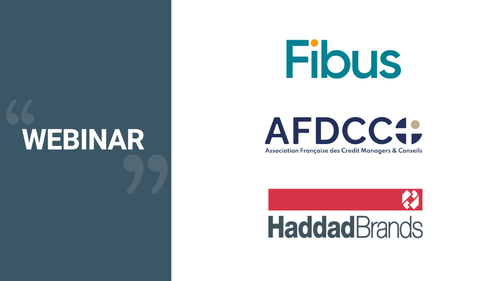Factoring, the most stable method of financing in the current economic turbulence
Gaëtan du Halgouët, founder of Fibus (formerly Chateaudun Crédit) and Romain Chaufour, factoring director, offered their expertise to Décideurs Corporate Finance. Regardless of the economic context or particular circumstances of the company involved, they explain why factoring is the least costly and most stable financing option available.


Whether the economic situation is worsening or a company is underperforming for its own reasons, factoring is the least costly and most stable credit line available and is a financing solution of particular interest for financial directors and corporate restructuring stakeholders, especially in 2023. Here is an interview with Gaëtan du Halgouët, founder of Fibus (formerly Chateaudun Crédit) and Romain Chaufour, factoring manager.
DÉCIDEURS. Could you please remind us what it is that makes factoring so specific?
Romain Chaufour. Factoring is a solution that allows a large portion of accounts receivable to be turned into cash. This financing tool is sometimes not very well known by financial decision-makers. And yet, it is of particular interest for BtoB companies, who are typically paid on 60 days. For these companies, factoring is the largest possible short-term credit line, and an extremely powerful cashflow lever.
Gaëtan du Halgouët. Another advantage of factoring is that it is a deconsolidation solution and, as such, does not appear on the balance sheet. Whatever the financial health of a company, it should be attractive to investment funds and financial directors alike. Contrary to widespread belief, corporate restructuring activities do not prevent the signing or negotiating of factoring agreements.
Gaëtan du Halgouët. Another advantage of factoring is that it is a deconsolidation solution and, as such, does not appear on the balance sheet. Whatever the financial health of a company, it should be attractive to investment funds and financial directors alike. Contrary to widespread belief, corporate restructuring activities do not prevent the signing or negotiating of factoring agreements.
Precisely, what are the benefits of factoring in the context of a corporate restructuring operation?
R. C. There are many! The first benefit of factoring lies in how quickly it can be set up. When a company is struggling, effective solutions need to be found fast, as the stakes are high. We are able to implement a factoring programme in just a few days, and financing of invoices then begins within the following 48 hours, which is a considerable advantage compared to other sources of financing.
G. H. Aside from the urgency, the other crucial point is the scale of financing offered. Factoring allows you to receive considerable financing, even where a company is underperforming. Factoring can be used in addition to or as a replacement of bank financing such as RCF, overdraft facilities or Dailly financing. When a company is no longer able to repay its debts, banks lose trust and often reduce or eliminate their banking support, which further exacerbates the company's weakness. Factoring offers the company an alternative as well as a sustainable financing solution.
R. C. The final benefit in the context of corporate restructuring is that factoring is not incompatible with insolvency and administration procedures. Factors remain open to negotiations and are willing to support struggling companies. In these instances, our role is to negotiate with the factor already in place, where applicable, and at the same time to seek a new partner. We are well aware of each factor's expectation.
"Companies are no longer dictated to by their environment, and transfer the pressures to a third party over whom banks have less control"
G. H. More widely, our role is to help alleviate the pressures placed on financial directors by banks. It is not uncommon to see banks promote their own factoring subsidiaries. However, this is not always the most relevant solution for a company. By allowing financial directors to make a free and enlightened choice, we give them back some room for manoeuvre. Companies' strategies are no longer dictated to them by their environment, and they transfer the pressures to a third party over whom banks have less control. Thanks to factoring, companies regain negotiating leveragee with creditors.
G. H. Aside from the urgency, the other crucial point is the scale of financing offered. Factoring allows you to receive considerable financing, even where a company is underperforming. Factoring can be used in addition to or as a replacement of bank financing such as RCF, overdraft facilities or Dailly financing. When a company is no longer able to repay its debts, banks lose trust and often reduce or eliminate their banking support, which further exacerbates the company's weakness. Factoring offers the company an alternative as well as a sustainable financing solution.
R. C. The final benefit in the context of corporate restructuring is that factoring is not incompatible with insolvency and administration procedures. Factors remain open to negotiations and are willing to support struggling companies. In these instances, our role is to negotiate with the factor already in place, where applicable, and at the same time to seek a new partner. We are well aware of each factor's expectation.
"Companies are no longer dictated to by their environment, and transfer the pressures to a third party over whom banks have less control"
G. H. More widely, our role is to help alleviate the pressures placed on financial directors by banks. It is not uncommon to see banks promote their own factoring subsidiaries. However, this is not always the most relevant solution for a company. By allowing financial directors to make a free and enlightened choice, we give them back some room for manoeuvre. Companies' strategies are no longer dictated to them by their environment, and they transfer the pressures to a third party over whom banks have less control. Thanks to factoring, companies regain negotiating leveragee with creditors.
Do you have any projections you’d care to share with our readers for 2023?
G. H. When French state-backed loans were etablished, companies could instantly borrow up to 25% of their annual sales revenue, with no conditions, or almost. Today, these loans must be repaid in considerable amounts that use up a large portion of cashflow. Implementing a factoring solution will help reimburse these loans in whole or in part. Accounts receivables of companies represent between 15% to 20% of annual sales revenue.
R. C. In 2023, we will see a slowdown in growth, along coupes with inflation in raw materials and energy, and an increase in interest rates. These increased risks will cause banks to lose their appetite, notably in terms of offering financing solutions. They will toughen up their criteria for issuing loans to companies, criteria that are not applicable to factoring. Factoring is calculated over a company's total accounts receivable, rather than over its share equity and profitability.
G. H. Factoring is an even more attractive solution since it allows a company to avoid increasing the number of its banking partners. Let’s take the case of a medium-sized company seeking a credit line of 10 million euros. If its accounts receivable value is at least equivalent, it will very quickly find this financing with a single factor. If it instead chooses a more traditional bank loan (e.g., RCF, overdraft facility, or Dailly loan), it will be forced to negotiate with several banks. Moreover, its financial solvency will determine the amounts awarded. Factoring is only a single credit line to be set up. The timeframe for this is much shorter and the total amount of the credit line will remain stable over time.
R. C. In 2023, we will see a slowdown in growth, along coupes with inflation in raw materials and energy, and an increase in interest rates. These increased risks will cause banks to lose their appetite, notably in terms of offering financing solutions. They will toughen up their criteria for issuing loans to companies, criteria that are not applicable to factoring. Factoring is calculated over a company's total accounts receivable, rather than over its share equity and profitability.
G. H. Factoring is an even more attractive solution since it allows a company to avoid increasing the number of its banking partners. Let’s take the case of a medium-sized company seeking a credit line of 10 million euros. If its accounts receivable value is at least equivalent, it will very quickly find this financing with a single factor. If it instead chooses a more traditional bank loan (e.g., RCF, overdraft facility, or Dailly loan), it will be forced to negotiate with several banks. Moreover, its financial solvency will determine the amounts awarded. Factoring is only a single credit line to be set up. The timeframe for this is much shorter and the total amount of the credit line will remain stable over time.
KEY TAKEAWAYS
• In 2022, Fibus (formerly Chateaudun Crédit) has overhauled its brand image and focused on the complementary nature of its three areas of expertise, with the creation of Fibus Factoring, Fibus Trade and Fibus Digital;
• Fibus achieved growth of 30% in the last financial year; 48% in sales revenue comes from international clients;
• Fibus teams handled over 50 cases for medium-sized and large-scale companies and 100 cases for small businesses in 2022;
• Fibus has 42 employees working in Paris, Poitiers, Lyon and London; in 2023, it will open an office in Frankfurt;
• In 2023, Fibus will launch ARI, a digital solution to optimise factoring and credit-insurance programmes unrivalled on the market.
• Fibus achieved growth of 30% in the last financial year; 48% in sales revenue comes from international clients;
• Fibus teams handled over 50 cases for medium-sized and large-scale companies and 100 cases for small businesses in 2022;
• Fibus has 42 employees working in Paris, Poitiers, Lyon and London; in 2023, it will open an office in Frankfurt;
• In 2023, Fibus will launch ARI, a digital solution to optimise factoring and credit-insurance programmes unrivalled on the market.
ABOUT THE INTERVIEWS
Gaëtan du Halgouët founded Fibus (formerly Chateaudun Crédit) alongside Thibaut Robet back in 2005. They made accounts receivable financing their speciality, and went on to become the leading factoring broker in Europe, and market leader in credit insurance brokering. Fibus advises all types of companies, from small companies to major international groups, and notably works in the private equity and restructuring sectors. Romain Chaufour is factoring director and responsible for development operations.
Read the full interview
Read the full interview
These articles may interest you

How Chimirec unlocked the full potential of its factoring with ARI Trade, by Fibus Digital
With ARI Trade, the Chimirec Group has reduced the time spent managing its factoring operations from 4 days to 1.5 days per month — representing a total time saving of 30 days per year.
Additional benefits for Chimirec’s CFO include improved working capital, a consolidated view across 15 factoring contracts, and enhanced receivables traceability.
Additional benefits for Chimirec’s CFO include improved working capital, a consolidated view across 15 factoring contracts, and enhanced receivables traceability.

How the Credit Manager safeguards the company’s cash flow
A function at the heart of financial stability The Credit Manager’s role extends far beyond preventing bad debt: today, they act as the true conductor of the order-to-cash process, ensuring the company maintains healthy, predictable, and actively managed cash flow. We
spoke with Thibaut Robet, CEO of Fibus, a firm specialising in order-to-cash management.
spoke with Thibaut Robet, CEO of Fibus, a firm specialising in order-to-cash management.

How can credit insurance support growth in a sector under pressure?
Economic difficulties are mounting and weighing more heavily on certain sectors: how can you make the Credit Manager a business partner who supports the company's growth? Discover the testimony of HADDAD BRANDS EUROPE in the webinar hosted by Alexia Monteillet, Credit Risk Manager at HADDAD BRANDS EUROPE, and Marc Chaquès, Credit Insurance Director at Fibus, in partnership with the AFDCC.
Contact us, so that, together, we can find the best solution for financing your accounts receivable.
Write us
